Hallmarks of Labour, Volume 8
Patricia Otuedon- Arawore, Hallmarks of Labour, Volume 8, Lagos, Mahogany Limited, 2017. ISBN: 978-36232-0-9.
Reviewer
Professor Osita Agbu
Introduction
I consider it an honour to be invited by the Hallmarks of Labour Foundation to review Hallmarks of Labour, Volume 8 authored by Patricia Otuedon-Arawore. Accepting this challenge enabled me to meet the giants that are our role models in this Volume in a most comprehensive way that I may not have been opportuned to. For this, please accept my gratitude.
The content page of Hallmarks of Labour, Volume 8 had in it, the usual reflections on the previous volume, and includes also a foreword, preface, various acknowledgements and dedication. Reflecting on Hallmarks of Labour Volume 7, Dr. Gaius Jackson E. Obaseki, in his Opening Remarks outlined prominent Nigerians that had been honoured in the past: Hon. Justice Chukwudifu Oputa, Professor Adeoye Lambo, Mr. Allison Ayida, Izoma Philip Asiodu, Professor Umaru Shehu, Professor Mrs.Grace Alele-Williams, Chief Chukwuemeka Anyaoku, Alhaji Ahmed Joda, Alhaji Babatunde Jose and Chief Mrs. Yetunde Emmanuel. Added to the list of these revered role models include: Justice Kayode Eso, Professor Ben Nwabueze and Professor Olujimi Akinkugbe. You must agree with me that these names are indeed, worthy of emulation, not just by the Hallmarks of Labour Foundation, but by all Nigerians and beyond.
From Dr. Obaseki, we are made to understand that the common themes among the role models in Volume 7 included the virtues of individual scholarship, a single-minded drive for excellence, dedication to service, willingness to serve, and above all, integrity. It will be interesting to see what we will discover in Volume 8 as the underlying denominators of the selected role models. Further, the reflections captured excerpts from the Reviewer, as well as comments and appreciations from important personalities.
Volume 8, which I am here to review is divided into three major parts, each part featuring a guest role model as follows:
PART1- His Excellency, Ambassador Oluyemi Adeniyi CON, HLR
PART 2- His Eminence Anthony Cardinal Olubunmi Okogie, HLR
PART 3- Professor Itsejuwa Sagay, SAN, HLR
The foreword to this edition is written by no other than the seminal Chief Philip C. Asiodu CFR, HLR, whom I first met in my lectures as a student of Political Science at the University of Ibadan. In short, he set the right tone for this Book by a re-visit of the mission of Hallmarks of Labour – that is using the histories and profiles of selected role models who have achieved success through hardwork, honesty and integrity to re-orient Nigerians from a culture of crass materialism and primitive wealth acquisition to that of honesty, integrity and commitment to service of our community and the nation in general. She should be much commended for keeping faith with this mission.
In Hallmarks of Labour volume 8, we see as observed by the author an interesting blend of law, religion and International Relations, each a fascinating aspect of society. The Volume is centred on three men of distinction who by dint of hardwork and moral uprightness attained great heights, and became established role mobdels for the younger generation.
The author dedicates Hallmark of Labour Volume 8 to two individuals: Mr Gamaliel Oforitsenere Onosode, also known as ‘Mr Integrity’ who passed on in 2015; and Samuel Ayitoritsede Otuedon Okore, for their support of the work of the Foundation.
With respect to methodology, the author has chosen a practical structure of introducing each celebrant with a forward written by a renowned Nigerian, presenting the background and achievements of the role models and drawing lessons from these. And finally, presenting a brief overview of the home front as necessary. Still, it may be necessary to carefully choose and edit the publications and writings of the role models, and the comments and testimonials of others that best depict the person and work of the role models.
His Excellency, Ambassador Oluyemi Adeniji CON, HLR
Our first Role Model featured in Volume 8 is His Excellency Ambassador Oluyemi Adeniji. The Foreword introducing him is written by Professor Bola Akinterinwa, the former Director-General of the Nigerian Institute of International Affairs, where I have coincidentally worked for the past two decades plus. Professor Akinterinwa spoke of the qualities of this Role Model as a person, public servant and father. Indeed, his eulogies of this Role Model could be regarded as an ‘Over-kill’. Does it mean that our Role Model has no faults? While we extol the virtues of individuals, we should also be forthright in pointing out areas of weakness as required, as this also serves as lessons for others.
Moreover, some of the explanatory sentences in the foreword tended to be long-winded. His Excellency, Olu Adeniji is introduced to us as an illustration of the international dimension of national development. The various positions held on behalf of Nigeria and the United Nations eloquently justify this assertion. Notable is the fact that he was the Special Representative of the UN Secretary General and Head of the UN Peace-making mission in Sierra –Leone, where we have had the largest UN mission in history. Amongst the other positions he held, he was later to become Nigeria’s Minister of Foreign affairs, and later of the Interior.
An accomplished diplomat, administrator and negotiator per excellence, Ambassador Adeniji was born in Ijebu-Ode on July 22, 1934. He variously attended primary education at Ijebu-Ode, Ibadan and Jos, and had his secondary education at the Ijebu-Ode Grammar School (1947-1952) where he obtained the Cambridge School Certificate in Grade one. It was noted that he was particularly good in mathematics. However, we note that Oluyemi Adeniji’s mother passed on when he was barely two years old, and he was thus raised by a combination of relatives, including his father and paternal grandfather. As we all know this kind of experience can either make a child wiser and more tolerant or in the alternative, a psychiatric case! Mercifully, in this case it only served to prepare our role model for the future and for the profession he eventually chose.
With a B.A [London] Honours degree from the University of Ibadan in 1960, which also happens to be my alma mater, Ambassador Adeniji joined the diplomatic service in 1960. He was to spend over 30 years in this profession that took him to virtually all continents of the world, serving in Washington D.C, Accra, Freetown, New York, Vienna, Geneva, Paris, and later appointed Director- General [Permanent Secretary] in the Ministry of Foreign Affairs until his formal retirement from civil service in February 1994.
In July 2003, he was appointed Minister of Foreign Affairs by former President Olusegun Obasanjo, where he initiated several innovations in diplomatic practice. However, although retired from public service, Ambassador Adeniji remains a highly versatile diplomat; adept at multilateralism and international security matters.
On the sub heading, Discourse Circuit, the Volume x-rays Ambassador Adeniji’s academic exertions and writings. From pages 34 to 98, the author comprehensively presents the scope and depth of Ambassador Adeniji’s lectures, reports and position papers on international questions.
What came out from this is that our Role Model is not just a diplomat, but also a highly seminal intellectual in the field of international politics. His deeply profound thoughts revolved around matters of mechanisms for conflict management in West Africa, economic dimension in Nigeria’s Foreign policy, and the application of nuclear technology for socio-economic development of Nigeria. On the matter of development of the peaceful uses of nuclear energy for example, he noted that an important and unfortunate cause of the loss of focus on the development of the peculiar uses of nuclear energy for Nigeria was the unnecessary diversion created by the campaign for building a ‘black bomb’. Making a case for the peaceful uses of nuclear energy, Ambassador Adeniji drawing from his immense experience while serving at the International Atomic Energy Agency (IAEA) stated that nuclear energy offered an environmentally compatible means of energy generation away from fossil fuel, particularly in the context of the desire to address global climatic change.
Further, his writings touched on the changing roles of international and supra national organizations with a clarification on the difference between an international and supra-national organization, He noted that being incapable of performing its primary function of maintaining international peace and security through collective security, the UN had to improvise, and created a secondary role of peacekeeping operations, seen as one of the greatest achievements of the UN beginning with the first operation in Palestine in1948. For him, the requirements for peace-making and peace-keeping cannot be over-emphasized and are an insignificant fraction of resources needed for military expenditures.
On p.98, which contained testimonials from home and abroad on our role model Ambassador Oluyemi Adeniji, we get a glimpse of who His Excellency really is. He is widely seen as a multilateralist that embraces neither isolationism nor interventionism. He rather preferred grooming respect for Nigeria in Africa. Quite interesting is the view of Dr. Kayode Fayemi, at present Honourable Minister of Solid Minerals Development that the stature of Ambassador Adeniji and his deep knowledge of the foreign policy establishment seemed to have curbed the interventionist proclivities of the then President Olusegun Obasanjo in the foreign policy arena. Gentlemen, please note this comment by Dr. Kayode, and I quote ‘… he retains an intellectual curiosity that is uncommon in many seventy years olds, always seeking the views of younger colleagues on issues’. It is believed that Ambassador Adeniji restored a measure of professionalism over politics in the Foreign Ministry.
I seize this opportunity to touch on the Love-Hate relationship existing between the Ministry of Foreign Affairs (MFA) and the Nigerian Institute of International Affairs (NIIA), which statutorily is an agency under the Ministry. My experience is that while the NIIA will like to be much closer to the Ministry, one gets the feeling that the Ministry gate-keepers prefer to keep the NIIA away from its activities. How then can one explain the bureaucratic take-over of the multi-million naira customised NIIA Headquarter building constructed by Julius Berger as NIIA’s permanent site, but brazenly usurped by the Federal Capital Development Authority for its own use as mere offices, without effort by the Ministry to retrieve it or restitution from the Federal Government. I see this as a case of misapplication of Government resources and bureaucratic injustice that should be rectified. And I call on the Federal Government to do so. How do we explain the non-inclusion of Research Staff of the NIIA in the numerous diplomatic meetings and negotiations of the Ministry? How then can the Institute be properly empowered to contribute to policy? The questions go on and on. My personal view on this matter formed from over 20 years of work at the NIIA is that this revered Institution should be in Abuja and not Lagos, while the present structure remains in Lagos as a Liaison Office together with the very rich Library to serve the academic and conference needs of Lagos and its environs.
Our Role Model, no doubt understands and appreciates the point I am trying to make. Seen as an excellent diplomat by Ambassador Tayo Ogunsulire, one of whom we refer to as the ‘12 Apostles’ in the Foreign Ministry, it is noted that the excellent work he did earned him the National Productivity merit Award in 1993, and the National Honour of Commander of the Order of the Niger (CON).
Professor Ayo Ajomo, OFR in celebrating Ambassador Oluyemi Adeniji at 70, had this to say- ‘Ambassador Adeniji is noted for diligence, hardwork, uprightness and loyalty. He is a highly disciplined and dedicated man with unalloyed loyalty and unstinted integrity’. What more can we say about our role model. He is also said to be an epitome of humility and exemplary simplicity in his day to day interaction with people.
Professor Tunde Adeniran, who coincidentally happened to have been my supervisor as an undergraduate student at the University of Ibadan sees in Ambassador Adeniji a man of wisdom, authority and of the ideal in foreign policy implementation. Indeed, he further categorises him as an outstanding intellectual, albeit a caustically witty diplomat, result oriented, supremely courteous, cultivated and urbane in international affairs. To crown all these accolades, Dr. Ibn Chambas, then Executive Secretary of ECOWAS, in evaluating Ambassador Adeniji’s work in the area of disarmament and peace-keeping, dubbed him an ‘Ambassador of Peace’ without whose efforts many souls would have been lost around the world.
It is important to note at this juncture, and as aptly put by Ambassador Jaiyeola Lewu, Ambassador Adeniyi is widely commended for authoring the highly acclaimed speech titled ‘Africa has come to Age’ of the then Head of State, General Murtala Muhammed at the OAU Summit in Ethiopia. The speech helped to rally international support for Augustino Neto’s MPLA against Savimbi’s UNITA, which was supported at that time by Apartheid South Africa and the United States. The international support garnered by Nigeria for the MPLA eventually led to its victory and independence of Angola, and brought the civil war in Angola to an end.
What more should we know about Ambassador Adeniji, only to ask whether we have had enough of his knowledge in multilateralism – I say no and hope that he will continue to train and grow new generations of diplomats through his writings and public appearances.
At the home front, Ambassador Oluyemi Adeniyi met, and married Margaret Olubunmi Adeniji [Nee Noah] in 1962, and they are blessed with a girl and two boys. Suffice to say that, was it not for her support, perhaps our revered role model will not be the man he is today.
His Eminence Anthony Cardinal Olubunmi Okogie HLR
Here, we have a personality that is difficult to strait-jacket. Perhaps, what is easier to say about his Eminence, Anthony Cardinal Olubunmi Okogie is not that he is a priest. But what a priest! A priest for almost five decades, Bishop for over 44 years. And Cardinal for more than 12 years. Indeed, he was appointed a Titular bishop at the age of 35. And hear this, received the Vanguard’s Newspaper Life-Time Achievement Award, 2016 for his role as a crusader for the common good. Without even reading what others have said of him, I see a fearless crusader of the general good, a visionary, disciplinarian and a pioneer in many fields of human endeavour. He dares to thread where others fear! This is our second role model, honoured by the Hallmarks of Labour Foundation.
Born in Lagos on 16 June 1936, Anthony Oluwabunmi Ewoime Okogie is a product of mixed marriage of Prince Michael Ohigbom Okogie (of Ishan stock, Uromi- Edo state) and Princess Lucy Adunola Okogie (Nee Afolabi, a Yoruba from the ancient town of Oyo). He comes from a family deeply rooted in Christian tenets. Checking his background, and this is always important, we are told that his father was a strict disciplinarian and a stickler for orderliness – both at home and at work. Young Anthony had to perform chores meant for boys and girls simultaneously- fetching water and firewood, washing the dishes, and sweeping the floor. In dusting his father’s radio, woe betide him if he mistakenly shifts the dial from the older man’s favourite BBC station. However, like all good parents, they spared no costs to give their children good education, which in his case, they could afford.
His eminence had his primary education at both Lagos Island, and Warri, and very notably became a student of St. Gregory College, Obalende, Lagos in 1951. Infact, his registration number is 1664. I stress this, because I happen also to be a Gregorian of the 1975/1980 [UP GREGS]. Infact, It was until a few weeks ago that I relinquished my position as President of my Set for the past nine years. This position enabled me appreciate the tremendous progress made by our Alma mater under the eagle eyes of his Eminence. Infact, His Eminence served as Proprietor of the College for over 30 years, and is currently the Chairman of the Old Boys Association Board of Trustees. St Gregory College is and was an institution renowned for its academic excellence, moral discipline, and sports, particularly football. His Eminence was said to be active in the classroom and outside of it as we will later come to see. He had two life-long friends; Benjamin Bello and Gabriel Fajumobi, whom he met at the College.
Young Anthony was much influenced by the Catholic Church. From an early age, he was an Alter Server at St. Michaels, Lafiagi – Lagos and in his third year at St Gregory’s College in 1954 took a life-changing decision, and became a student of St. Theresa’s Minor Seminary, Ibadan. In short, young Anthony went through gruelling sacrifices, tutelage and self-discipline at both the Minor Seminary and Saints Peter and Paul Major Seminary, Bodija, Ibadan before completing his training as a priest at the Catholic Urban University, Rome. He was able later to conclude his Masters and doctoral studies from the famous University. It suffices to note that his Eminence was indeed, an active student and took part in football as well as student unionism.
On 4 December, 1966 Anthony Olubunmi Okogie was ordained a priest of the Roman Catholic Church. One can make bold to say that The Catholic Archdiocese of Lagos was never the same after this! The event attracted a large crowd of the young and elderly who were excited by the progressive transformation of the Alter-server and Chorister in Lafiaji, Lagos, to a full-fledged priest. Later dubbed the ‘Peoples Priest’, and much later, the ‘Peoples Cardinal’, the young priest was assigned several tasks that he executed quite satisfactorily. His appointment as Master of the Ceremonies (MC) at Holy Cross Cathedral, Lagos further enhanced his popularity among the laity and clergy alike. He was an orator, mobilizer, motivator and humourist. He also anchored and presented quite a number of religious programmes on radio and television. As if these tasks were not enough, Revd. Fr. Okogie was drafted into the Nigerian Army Chaplaincy, and attached to the famed 3rd Marine Commando Division under the command of the dreaded ‘Black Scorpion’ Colonel (later Brigadier) Benjamin Adekunle, where he ministered to the spiritual needs of the fighting troops.
Another turning point in the life of our role model came on 29 August 1971, barely five years into his ordination as a priest; Anthony Oluwabunmi Okogie was appointed Auxiliary Bishop of Oyo Diocese, concurrent with the post of Vicar-General of Oyo Diocese. Further, he was elevated to by-pass the rank of Monsignor in the same year that Urban Catholic University, Rome awarded him the degree of Doctor of Divinity (Honoris Causa). He faced tremendous opposition to his appointment by the bulk of the Catholic faithfuls in Oyo Diocese, and described this as his first real ‘Baptism of Fire’. He soldiered on, and was mercifully reposted to the Catholic Archdiocese of Lagos as Auxiliary Bishop upon the passing of the incumbent Catholic Archbishop, Most Revd. John Kwao Aggey in mid-march of 1972. He was subsequently approved as successor to Most Revd. Aggey by the Vatican Ambassador to Nigeria, Archbishop Amelio Possi.
At the young age of 37, specifically on 17 June 1973, Bishop Okogie was installed Archbishop of Lagos. He therefore became the first Nigerian Prelate of the Holy See of the Cosmopolitan City of Lagos. Since then, His Eminence has been instrumental in growing the church (from 17 to 132 Parishes), its flock, the priesthood, as well as the establishment of several medical centres.
For Nigeria and Christendom, a milestone was achieved when out of the no- where, Anthony Olubunmi Okogie was elevated to the position of Cardinal, and became a Prince of the Roman Catholic Church on 21 October, 2003. He thus became the third cardinal from Nigeria, after Dominic Cardinal Ekandem and Francis Cardinal Arinze. Nigeria now has a fourth cardinal in John Cardinal Onaiyekan. It is noted that in his capacity as Cardinal Priest of the Blessed Virgin Mary of Mt. Carmel of Mostecciano, His Eminence, was among the Cardinal that voted Pope Benedict XIV in 2005, and Pope Francis in 2013.
In this Volume, it is noted on P.134 that as a priest, Anthony Cardinal Okogie was easily the most visible model of the social conscience of the church as an agent of positive change. He used his good offices to promote the essence of equity, social justice and good governance. He was a torn in the flesh of Nigerian dictators and those that perpetrate bad governance, and had the courage to speak out. His Eminence, even in old age, remains a visionary, being instrumental in the founding of Augustine University (AUI), Ilara-Epe in Lagos state. Not one to sing his own praises, he simply stated that he remains grateful to God for his achievements. Here, indeed, we have a role model, who stayed true to his calling as a priest and used the platform to touch humanity in ways that many cannot. We can only acknowledge his sacrifices, and thank God for his grace.
In the commentaries and presentations, what clearly come through are the multiple roles which his Eminence played over the decades – his love for quality education (he fought a titanic battle for the return of private Mission Schools for twenty-two and a half years), his uprightness and simplicity, with some seeing him as a radical priest and social crusader, his defence of the voiceless and love of children, and his concern for Nigeria and its leadership. On his un- compromising stance against successive governments, Anthony Olubunmi Okogie, not because he is priest, or even a Bishop or Cardinal, stated that he does not necessarily fight governments, but injustice. This is the quintessential ‘Peoples Priest’.
From the testimonials, we could clearly deduce that there is indeed politics in the church, or what some have referred to as church politics. The Oyo Archdiocese Affair is a case in point. However, I cannot end this review on the life and times of His Eminence as a Role Model without intimating you of this account to show that His Eminence inspite of all these achievements is after all human. Sir Steve Omojafor describes in this Volume how His Eminence as a young seminarian played football with the boys, climbed tree-tops in search of fruits and even once in a while went up the ladder with them onto the roof top of one of main building to watch Indian films free-of-charge (FOC) unknown to the authorities.
Ladies and gentlemen, inspite of all we have been able to learn from our role model, there are still many more we do not know. To His Eminence, we extend our highest respect and appreciation for his life.
Professor Itsejuwa Sagay SAN, HLR
Although, I have never really had the opportunity to meet our next role model in person, his name kept popping up in conversations from time to time, not in any bad way, but in relation to one assignment or event that had to do with law. A distinguished scholar, legal luminary, administrator and human rights advocate, Professor Itsejuwa Esanjumi Sagay was born some 76 years ago in Ibadan into a middle class family. First of 11 children from three mothers, his was however, not a polygamous family as the mothers were not married simultaneously. His father, Pa Andrew Agbaminebitse Esanjumi Sagay was a teacher, and actually taught his first son in secondary school. As a strict disciplinarian and man of integrity, Papa ensured that his children imbibed the culture of hard work, integrity and responsible conduct. Indeed, it is instructive to note that as documented, when his father was in charge of the then Bendel State Local Government Service Commission – “some people who were lobbying to get one position or the other would come to our house and drop all sorts of gifts. My father rejected those gifts outright and anybody who accepted them on his behalf was in trouble and had to find a way to return them”. This really is the way it should be and young Itse imbibed the lofty principles laid by his father. It was a case of setting the right examples practically, and not just by talking. Much was expected from Itse as the first son in respect of his school work and good behaviour, and these were difficult to sustain.
Our role model adored his mother, who was a mid-wife and later health visitor, noting that his mother was a hardworking and ambitious woman like most Itsekiri women. And this really impressed him. His mother seamlessly complemented the father. While his father insisted on integrity, good public life, status and honesty; the mother placed premium on self -fulfilment and the attainment of a decent and comfortable life. This was a good balance, as the financial accomplishment of his mother later helped him in life.
Itsejuma attended CMS School, Warri beginning from 1946. And recollected that Warri was then a small town composed of all the ethnic groups that interacted in harmony with each other. He completed his primary education in 1954, and proceeded to Government College, Ughelli after a tough entrance examination. He thinks highly of the institution, and reveals that English and English Literature were his best subjects, and while he enjoyed Mr. (later Ambassador) Ogunsulire’s classes, he was hardly a favourite of his Latin Master! Guess who? Mr.(later Dr.) Christopher Kolade. Funny, but he noted in his interview that this strained relationship did not improve even after he left College. Why would our role model want to mention this?
Indeed, Professor Sagay said that he performed so poorly in Dr. Christopher Kolade’s class that in later years, the latter always appeared shocked when he achieved academic laurels. And he actually had to quit as Programme Operator at the Nigerian Broadcasting corporation (NBC), Ikoyi, Lagos when Christopher Kolade was Deputy Director-General, as he refused to promote him, even after he made 3 ‘A’ level papers at one sitting. Our role model subsequently resigned the job for the sake of career progression.
It was only as I further read this captivating volume that it became clear why our role model had to reveal this. Infact, he stated that he was not a bright student at the primary and secondary schools, and often managed to squeeze through from class to class. Indeed, his principal wrote in his report that he was not likely to pass the School Certificate Examination. When his father saw this, he advised him that he had given him all the opportunity to do well, and that some of the men who were digging drainages and sweeping the streets were his former classmates, and if he (Itse) wanted to belong to that class that was his choice . This shook up young Itse and he sat up, and decided to take his studies more seriously. This was a turning point in his life. It appears that there is always a turning point in one’s life and when one takes the right turn or makes the right decision, success follows. Our role model tells us that he almost later made a Grade 1, but ended up with a fair Grade 2 with six credits that included mathematics. This shocked his mathematics teacher. Infact, his mathematics teacher would later encourage other students by telling them: ‘do not worry, you will improve; you are doing well. Sagay did worse and ended up well’. The rest is history.
Professor Sagay later worked as clerk with Customs and Excise Department in Lagos, the National Broadcasting Corporation (NBC), and attended classes at the Federal School of Science, Lagos. He did correspondence course for London General Certificate of Education (Advanced Level) in History, Economics and Government and passed the three subjects and in 1962 was offered a place at the University of Ife (UNIFE), Ile-Ife to study law and not medicine as he initially wanted. For him, law was more relevant to be able to contribute to national debates, and not be stuck in the hospital performing surgery! Medicine’s loss was the legal profession’s gain. This marked the beginning of several decades of activism in public life.
Professor Itse Sagay recalls that his degree result and accompanying awards were the most gratifying in his adult life. He ended up with the best LL.B result in the country, was given a national scholarship for his performance with all his previous fees refunded to him by government. With this exceptional result, Professor Sagay had a choice of careers, and opted for the academia for obvious reasons. He joined the Law Faculty of UNIFE as Assistant Lecturer. He later joined the University of Benin as Dean Faculty of Law and retired after 20 years in full time academia. No wonder then, his name kept coming up in several legal and political documents. Infact, our role model returned two more times to the academia, and finally hung his academic gloves in September 2004.
He served in several other capacities as consultant, member of Governing Council, Lecturer at the Nigerian Institute of International Affairs (NIIA), Lecture Series, distinguished scholar to NIIA’s 40th Anniversary of the United Nations (1985), and more recently Chairman Presidential Advisory Committee against Corruption. He also established his legal practice, Itse Sagay & Co. (Legal Practitioners and Consultants). This is a very important Committee set-up to by the Muhammadu Buhari government to ‘advise the Federal Government on the prosecution of the war against corruption and the implementation of required reforms in Nigeria’s criminal Justice system’. Who better to head this, than Professor Itse Sagay.
Professor Sagay was appointed to the status of a Senior Advocate (SAN), mainly on the basis of his advocacy through his publications. He is a voracious writer. Our role model has written substantially on corruption issues, especially public corruption, the Rule of Law and democracy, the administration of Criminal Justice, and the National Question. Professor Sagay sees the National Question as nothing, but the competition and conflict between Nigerian ethnic nationalities regarding the control of political power and resources in Nigeria, structurally solidified by the British colonial government with the amalgamation of 1914, and the balkanization of the South into two regions, thereby giving political advantage to the North. The rest we know.
In respect of his character, he is a defender of truth, justice, righteousness and lives by the principle of thoroughness, excellence and honesty. He has been described as a giant of law, voice of the voiceless and of the oppressed. He is known to have taken briefs of the under-privileged at his own cost to ensure not only that their voices are heard, but that they get justice. Professor Sagay is seen as a great mind, a profound legal pundit and defender of peoples’ rights, an excellent teacher, especially of the Law of Contract. The testimonial by the much respected Babatunde Raji Fashola SAN, former Executive Governor of Lagos state, and currently Honourable Minister of Works, Power and Housing; opined that if teaching is an Art, then Professor Sagay is the master of the Art. He is equally seen as a complete and civilised gentleman. For our role model, ideas however brilliant do little to make the world better if one does not engage with the real world. His favourite advice to people is ‘leave this world better than you met it …’.
At the home front, Professor Sagay has a fulfilling union with Mrs. Sheila Tare Sagay (Nee Ogedegbe). They got married in Ile Ife on 27th March 1977 and are blessed with three children – Jemide Olamire, Andrea and David. Sadly, Jemide passed on in 2004 at the young age of 25. This was a low point in the distinguished Professor’s family, and this could be felt even from the printed pages. May his Soul Rest In Peace? Amen.
Prof. Itsejuwa Esonjumi Sagay’s career as a towering legal luminary, teacher, mentor, and social activist holds great lessons for all, especially the youth, in respect of consciously working towards ones destiny inspite of seeming disadvantages. It is said that God helps those, who help themselves. His has been a long labour of love in academia and advocacy for the voiceless, for a better Nigeria.
Shortcomings
There is hardly any printed material or book that does not have its fair share of avoidable errors, including technical deficiencies. Volume 8 of the Hallmarks of Labour has some shortcomings that should be addressed in subsequent revisions. On page 32 line 4, there is the figure (4) that does not seem to fit into the sentence. This figure 4 also appeared on page 136. On page 57, there is also a figure 6 that should not be there. On page 104, the word ‘interaction’ is omitted. The use of the and (&) symbol was repeatedly used in several pages of this Volume. This is not acceptable in printed material and could send a signal that the book is not properly edited. This could be found on pages122, 124,127 and190. There are also factual errors on Pages 136 and 137 that need to be corrected.
Nevertheless, this book made for very interesting reading, and even though I was quite exhausted while preparing this Review I could not just put it down. The language is smooth and the structure easy to follow. I commend this very educative document to all, especially the youth and all those who seek to understand the path to self-fulfilment and relevance in society.
Conclusion
In concluding, Distinguished Chairman, Ladies and Gentlemen, we clearly see some common denominators in the ingredients that came together in making our role models who and what they are today. These include the love of parents and value placed on education, discipline at home, at school and work, making the right choices at critical periods in one’s life, hard work, sacrifices, working for others and helping others, and having the courage to speak up against social ills in the society. To different degrees, all of our role models featured in this Volume had these attributes. Do we still have role models in Nigeria? Yes, we do, but they are fast becoming extinct. The present generation requires to consciously learn from the lives of our role models as articulated by organizations like the Hallmarks of Labour Foundation, so that they can in turn become role models for future generations of Nigerians. At the end of the day, what we want is a Nigeria that works, and a Nigeria that respects the human person.
Thank you Ladies and Gentlemen for your patience.
Professor Osita Agbu
April 27, 2017
Lagos
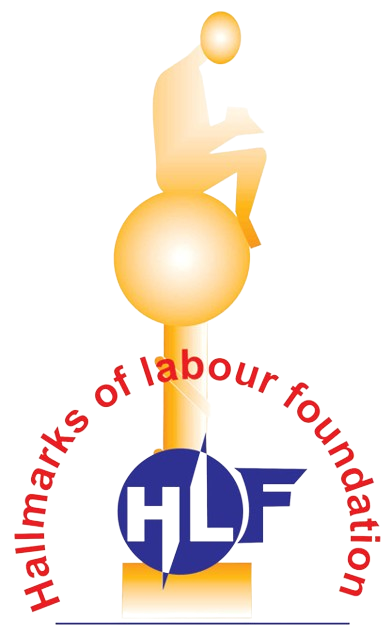
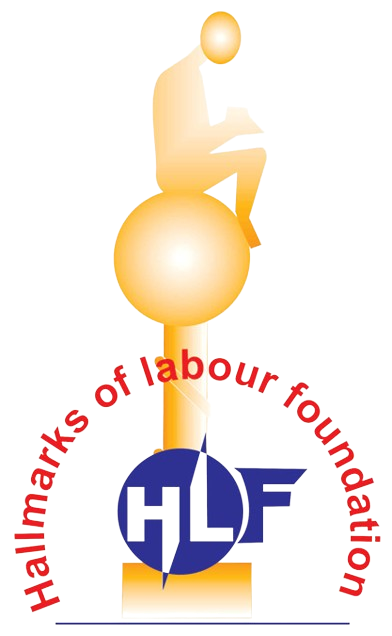
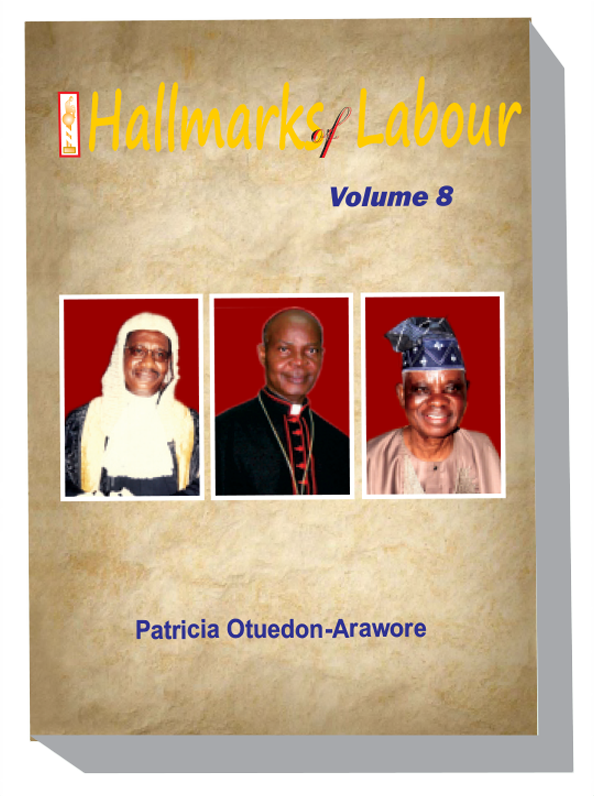
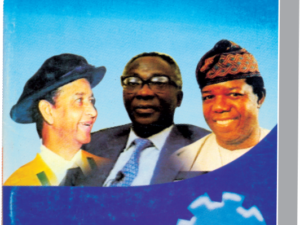
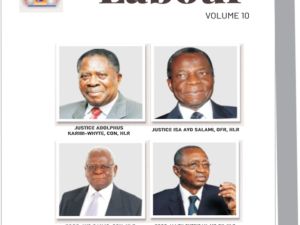
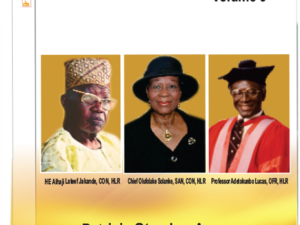
Reviews
There are no reviews yet.